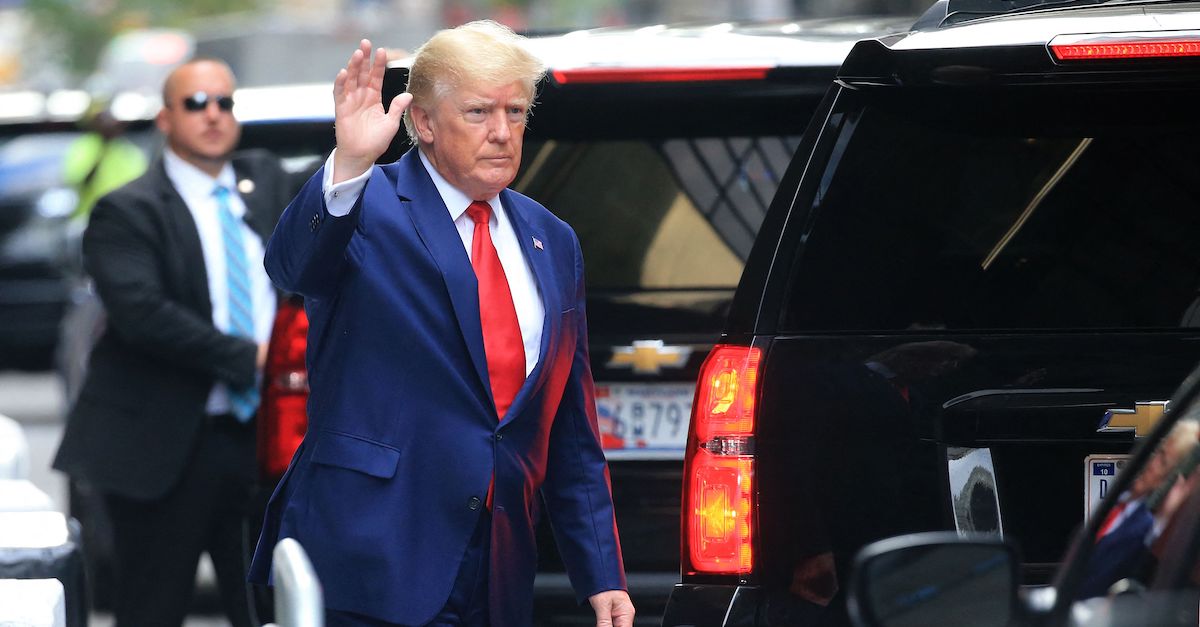
Former US President Donald Trump waves while walking to a vehicle outside of Trump Tower in New York City on Aug. 10, 2022.
An attorney for former President Donald Trump filed a motion in federal appellate court this week seeking to put the kibosh on New York State’s multi-year investigation into allegedly “fraudulent or misleading” asset valuations for Trump Organization properties.
The investigation by New York Attorney General Letitia James (D) has not resulted in an actual case being filed so far, but rather, a fairly limited discovery-focused process that has largely dealt with enforcing subpoenas in order to gather information. Conversely, however, James’ work has been put to use in a separate, but related, criminal investigation into Trump Organization tax practices being conducted by the Manhattan District Attorney’s Office.
In the Tuesday filing with the U.S. Court of Appeals for the Second Circuit, attorney Alina Habba argues the AG’s investigation is both “harassing and overreaching.” The 45-page brief asks the court to step in so as to protect the 45th president’s rights and “to curtail this improperly motivated and unconstitutional abuse of process.”
James launched her investigation into Trump Organization asset valuation practices over three years ago. The ongoing probe, she says, was initiated after Trump’s longtime personal lawyer and fixer, and former friend, Michael Cohen, testified before Congress that the then-president’s namesake family business was “cooking the books.” The company has consistently denied those claims.
In December 2021, Habba filed a motion in federal district court seeking to have the investigation dismissed on the basis that James was “guided solely by political animus and a desire to harass, intimidate, and retaliate against a private citizen who she views as a political opponent.” Eventually, U.S. District Judge Brenda K. Sannes disagreed, writing that even though James’ “public statements reflect personal and/or political animus toward” Trump, that”is not, in and of itself, sufficient” to show that the investigation was biased.
Trump’s lawsuit was dismissed in May of this year.
Vowing to appeal at the time, on the basis of an exception to a general legal doctrine that precludes federal courts from intervening in state court proceedings, Habba has now made good on that promise.
The Trump brief takes issue with the district court’s ruling for focusing “solely on the manner in which the investigation has been conducted,” rather than looking at “the subjective bad faith of the prosecuting authority.” The brief cites precedent to argue an inquiry into such alleged bad faith is “the gravamen of the exception” to the doctrine that aims to keep federal courts out of state courts’ business.
From the filing, at length:
In fact, the District Court even acknowledged that [James’] public statements make clear that she disagrees vehemently with Mr. Trump’s political views” and admitted that [James’] public statements reflect personal and/or political animus toward [Trump]…
Given the District Court’s finding of personal animus between the parties—and given that the “subjective motivation of the state authority in bringing the proceeding is critical to, if not determinative of, [a bad faith] inquiry”—there is no support for the District Court’s holding that “Plaintiffs have failed to identify a disputed issue of fact here which would require an evidentiary hearing.” This is particularly true given the heightened concerns United States Presidents have of being targeted for politically motivated state action.
Based on the foregoing, the District Court erred in declining to apply the bad faith exception to the Younger abstention doctrine to the Federal Action or, at a minimum, to hold an evidentiary hearing concerning this issue.
The underlying action is based on allegations the Trump Organization inflated the value of certain business assets in order to obtain more favorable loan terms while also fraudulently deflating the value of other assets in order to secure lower property tax rates.
In February of this year, Manhattan Supreme Court Justice Arthur Engoron declined to quash civil subpoenas and depositions for members of the Trump family, writing in an 8-page ruling that it “would have been a blatant dereliction of duty (and would have broken an oft repeated campaign promise)” for the attorney general not to investigate those fraud allegations that came via Cohen’s February 2019 congressional testimony. Two months later, a higher state court affirmed Engoron’s ruling.
In dismissing Trump’s federal lawsuit earlier this year, Judge Sannes found that the New York State court decisions to uphold the subpoenas invoked the doctrine of res judicata, essentially meaning that the court system had already dealt with the issue in full and the issue was therefore settled as a matter of law.
Habba’s filing on behalf of Trump argues against that notion, saying that the district court’s order elided several key points.
“Review of the contents of the relevant orders entered in the State Court Action further confirms that none of them touched upon the issues or claims put forth in the Federal Action,” the Tuesday filing says. “The constitutionality and/or lawfulness of the OAG’s investigation was never raised, addressed or discussed in any of those orders. Indeed, the 2020 Orders do not contain even a cursory reference to those issues.”
Additionally, Trump’s brief argues, the general thrust of the federal lawsuit was reduced to a complaint about subpoenas by the lower court. That understanding, Habba argues, gets the whole case wrong.
Again, the filing at length [emphasis in original]:
Given the severely restricted nature of the State Court Action, the State Court did not—and cannot—rule on the issues before the District Court. The State Court Action is a special proceeding with a very narrow purpose and scope, focusing only on the viability of each subpoena as opposed to the constitutionality of the investigation as a whole. The Federal Action, in contrast, looks beyond any particular subpoena and seeks declaratory and injunctive relief affirming that [James’] investigation is unconstitutional in its entirety. In other words, Plaintiffs are seeking to stop the investigation as a whole, not just quash certain subpoenas.
The full brief is available below: